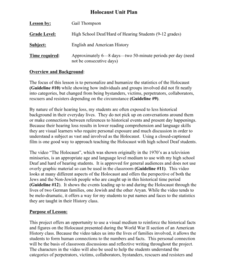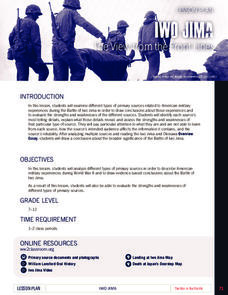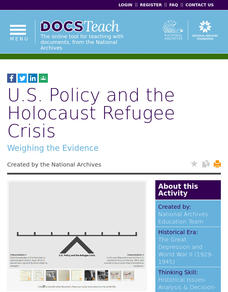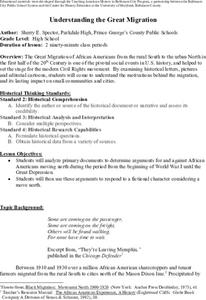Western Illinois University
Holocaust Unit Plan
Would it have been you? Scholars investigate the horrors of the Holocaust during World War II. They view, interpret, and analyze the video The Holocaust to gain insight into who exactly was impacted by the events Europe. They then...
Equality and Human Rights Commission
Influencing Attitudes
Does propaganda—like that used during the first World War—exist today? The 11th instructional activity in a series of 12 highlights the role of media when it comes to influencing attitudes. Scholars learn about sensational headlines,...
National WWII Museum
Evaluating the US Decision to Drop the Atomic Bombs
While the use of the atomic bomb was the definitive end of World War II, the terrible weapons left new questions. Young scholars use primary sources and analytical worksheets to consider the implications of the fateful decision. Then,...
National WWII Museum
Iwo Jima: The View from the Front Lines
Iwo Jima was the site of some of the most grim fighting in World War II. Learners consider this fact while examining primary sources, including letters home, from those on the front lines. After they complete the analysis, scholars then...
National WWII Museum
On Leave in Paris: Maps as Primary Sources
Primary sources—even those that seem mundane—offer a window into those who experienced history. Using a Red Cross map offered to soldiers stationed in Paris after World War II alongside worksheet questions, scholars consider what life...
National WWII Museum
Rationing by the Numbers: Quantitative Data as Evidence
What was it like to live on wartime rations in the United States during World War II? Young historians find out by exploring how those on the home front bought food thanks to the ration system. Other data includes statistics on car sales...
DocsTeach
U.S. Policy and the Holocaust Refugee Crisis
How did the United States respond to the Holocaust refugee crisis during World War II? The activity focuses on the United States' foreign policies and the arguments for and against offering assistance. Scholars analyze historical...
US House of Representatives
From Exclusion to Inclusion, 1941–1992
The legacy of Japanese American internment impacted America for decades, including Congress. Class members consider the tenure of Asian American representatives in Congress and how the legacy of World War II affected their service. Other...
Center for History Education
Understanding the Great Migration
What would make someone leave home and travel thousands of miles to find another one? Young historians look at letters, demographic data, and artwork to answer the question for the Great Migration, or the movement of thousands of African...
American Institute of Physics
African Americans and the Manhattan Project
A lesson about the Manhattan Project will explode young physicists' understanding of the racial attitudes in the United States during and after World war II. Groups select an African American scientist or technician that worked on the...
Penguin Books
Teacher’s Guide: The Diary of a Young Girl The Definitive Edition By Anne Frank
A line from Anne Frank's diary reads, "What is done cannot be undone, but one can prevent it happening again." Indeed, that is the hope for scholars who study her diary. The 19-page guide to the Definitive Edition of The Diary of a Young...
Global Oneness Project
Architectural Wonders
Angkor Wat, a UNESCO World Heritage Site located in Cambodia, is the focus of a lesson that asks class members to consider factors that could result in the destruction of these archeological treasures. Pupils listen to a...
Curated OER
Abolitionists and Their Impact on Sectionalism
Eleventh graders examine the impact of Abolitionist leaders on sectionalism. In small groups, they conduct research on a famous abolitionist, and develop and write a newspaper cover page based on their assigned abolitionist.
Digital History
Compensation for Slavery
Should Americans provide compensation to those whose ancestors suffered from slavery? Read and analyze the arguments of two modern-day journalists on the topic. Then, have a discussion on both the merits of the arguments as well as what...
Bill of Rights Institute
Post-WWII Boom: Transition to a Consumer Economy
The war is over! Scholars investigate an AP review video to uncover the post-WWII era in the United States. Viewers examine and analyze the consumerism that arose in post-war America. This is the eighth installment of a nine-part...
US House of Representatives
Exclusion and Empire, 1898–1941
Often forgotten and written off as the model minority, Americans with heritage in Asia and the Pacific Islands have played an essential role in American history, including Congress. Budding historians reclaim history by researching the...

















